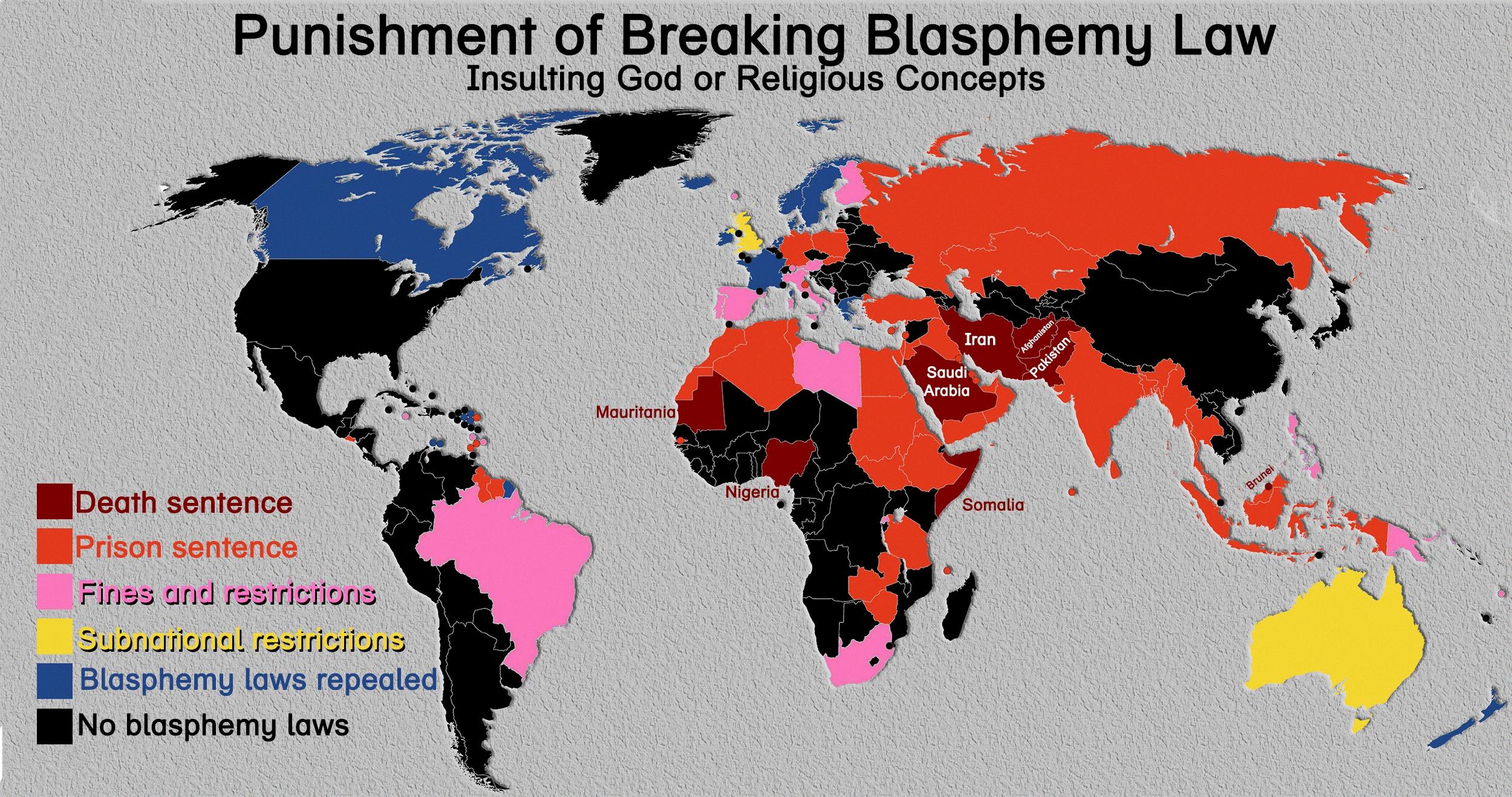Blasphemy is a term that refers to showing disrespect or irreverence towards a deity or something considered holy. In religious contexts, blasphemy is considered a grave sin and can lead to punishment or condemnation. Here are some examples of blasphemy:
1. Taking God’s name in vain: This is a common form of blasphemy where someone uses God’s name in a disrespectful or casual manner. For instance, saying “Oh my God!” or “Jesus Christ!” as an exclamation witout any religious context.
2. Insulting religious figures: Disrespect towards religious figures like prophets, saints or holy men is also considered blasphemy. This can include mocking or ridiculing them, or making jokes at their expense.
3. Disrespecting religious texts: Holy texts like the Bible or the Quran are considered sacred by their respective religions. Any act of disrespect towards them, like tearing them or defacing them, is seen as blasphemy.
4. Denying the existence of God: This is a form of blasphemy that occurs when someone denies the existence of God or challenges the fundamental beliefs of a religion. This can be seen as an attack on the very foundation of the religion.
5. Creating blasphemous art: Art that depicts religious figures in a disrespectful or irreverent manner can also be seen as blasphemy. This can include obscene or offensive portrayals of Jesus or other religious figures.
6. Engaging in sacrilegious acts: This includes acts like desecrating religious shrines or places of worship, stealing religious artifacts, or using religious symbols in an inappropriate manner.
It’s important to note that what is considered blasphemy varies between different religions and cultures. What may be considered blasphemous in one religion may not be in another. It’s also important to respect the beliefs and practices of others, even if they differ from our own.
The Definition of Blasphemy
Blasphemy can be any act or statement that shows great disrespect towards God or something considered holy. This can include mocking or ridiculing religious figures or practices, using religious symbols or objects in a disrespectful manner, or directly insulting God. Additionally, blasphemy can also be considered any action that goes against the teachings or beliefs of a particular religion. It is important to note that what is considered blasphemy can vary between different religions and cultures, and what may be considered blasphemy in one context may not be in another.

Examples of Blasphemous Thoughts
An eample of a blasphemous thought could be a thought that goes against a person’s religious beliefs. For instance, a person who believes in Christianity may have a blasphemous thought that questions the existence of God or doubts the divinity of Jesus Christ. Similarly, a person who follows Islam may have a blasphemous thought that disrespects the Prophet Muhammad or the Quran. These thoughts can arise from various sources such as personal doubts, exposure to different beliefs, or mental health issues, and can cause significant distress and guilt for the individual. It is important to note that having blasphemous thoughts does not necessarily mean that a person has lost their faith or is a bad person. It is a common experience that can be addressed with the help of religious leaders, mental health professionals, or support groups.
What Constitutes Blasphemy in Christianity?
In Christianity, blasphemy is defined as irreverence or disrespect towards a deity or deities. This can include using profanity or disrespectful language towards God, Jesus, or other figures in the Christian faith. Additionally, blasphemy can include mocking or ridiculing religious beliefs or practices.
It is important to note that blasphemy is different from heresy, which involves holding a belief that is contrary to orthodox Christian teachings. While heresy may be considered a sin, it is not necessarily blasphemy.
In some Christian traditions, blasphemy is considered a serious offense and can lead to excommunication or other forms of punishment. However, the severity of the punishment may vary depending on the specific denomination or branch of Christianity.
Is Using ‘OMG’ Blasphemous?
Whether saying “OMG” is considered blasphemy or not depends on one’s religious beliefs and interpretation of the Ten Commandments. In Christianity, blasphemy is defined as the act of insulting or showing contempt or lack of reverence for God. The Third Commandment specifically states “Thou shalt not take the name of the Lord thy God in vain.” Some Christians believe that saying “OMG” is a violation of this commandment beause it is a casual or irreverent use of God’s name. Others argue that “OMG” is not a direct reference to God and therefore does not qualify as blasphemy. Ultimately, it is up to individuals to decide for themselves whether saying “OMG” is a form of blasphemy or not based on their personal beliefs and values.
The Ultimate Form of Blasphemy
The highest form of blasphemy is cursing God. This means using disrespectful and offensive language towards God, which is considered a serious offense in many religions. It is also considered blasphemy if one thinks unworthy thoughts about God in their hearts. This is bcause God is considered to be holy and deserving of the highest level of respect and honor. It is important to note that blasphemy is not just limited to verbal expressions, but also includes thoughts and actions that are disrespectful towards God. Therefore, it is important to be mindful of our thoughts and actions towards God and always show reverence and respect towards the Divine.

Source: time.com
Forgiveness of Blasphemy
According to the gospel of Matthew, Jesus Christ stated that almost all blasphemies can be forgiven. This includes even those committed against the Son of Man. However, he also adds that blasphemy against the Holy Spirit cannot be forgiven and is considered an eternal sin. This means that any person who blasphemes against the Holy Spirit will not receive forgiveness for their sin, no matter what they do. Therefore, it is crucial to avoid committing this sin and to always be mindful of our words and actions towards the Holy Spirit.
The Consequences of Blasphemous Actions
Blasphemous actions refer to behaviors or expressions that insult or show disrespect towards a deity, religious belief, or sacred object. This can include profanity, sacrilegious acts, or any behavior that is considered to be disrespectful or sacrilegious by a particular religious group. For example, in Christianity, blasphemy can include mocking God, Jesus Christ, or the Holy Spirit. In Islam, blasphemy can refer to insulting the Prophet Muhammad or denying the existence of Allah. The specific definition of blasphemy can vary depending on the religion or culture in question. Blasphemy is oten considered a serious offense that can result in social ostracism, legal penalties, or even violence.
Can Blasphemy Be Forgiven?
Not all blasphemy is unforgivable according to the Christian Scriptures. In Matthew 12:31-32, Jesus states that “blasphemy against the Spirit shall not be forgiven.” This particular kind of blasphemy is commonly understood to refer to the intentional and persistent rejection of the work of the Holy Spirit. It is seen as a willful denial of the power and authority of God, which makes it impossible for the individual to receive forgiveness. However, other forms of blasphemy and sin are forgivable through confession and repentance. It is important to note that forgiveness is always avalable to those who seek it with a sincere heart.
The Definition of Blasphemous Language
Blasphemous language refers to speech or writing that shows a lack of respect towards God or a religion. It can take many forms, such as using profanity or derogatory language to refer to religious figures, mocking religious practices or beliefs, or making statements that are considered sacrilegious or offensive to believers. Blasphemous language is often considered taboo in many cultures and religions, and may be punishable by law in some countries. It can be a source of controversy and offense for those who hold religious beliefs, and may lead to social or legal consequences for the speaker or writer.

Source: reddit.com
Is Blasphemy Committed by Taking The Lord’s Name In Vain?
According to religious beliefs, taking the Lord’s name in vain is considered a form of blasphemy. It involves using God’s name or titles thoughtlessly, disrespectfully, or inappropriately. This act is considered a sin in many religions, including Christianity, Judaism, and Islam. The severity of this offense varies from religion to religion, but it is generally considered a serious offense against God. In some cases, it may even be punishable by law, as it is considered an act of disrespect towards religious beliefs and practices. Therefore, taking the Lord’s name in vain is considered blasphemy by many religious traditions.
The Implications of Swearing as Blasphemy
Swearing is the act of usng offensive language or obscenities to express anger or frustration. On the other hand, blasphemy refers to the act of insulting or showing contempt for something considered sacred or revered, particularly in a religious context.
Therefore, swearing is not necessarily a blasphemy, although it can be considered disrespectful or offensive in certain situations, particularly in religious contexts. The use of swear words to invoke deities or religious figures can be seen as a form of blasphemy, as it is using sacred names or concepts in a profane manner.
It is worth noting that the definition of blasphemy varies depending on the culture and religion in question, and what is considered blasphemy in one culture or religion may not be seen as such in another. It is important to be mindful of the cultural and religious sensitivities of those around us, and to use language that is respectful and appropriate in different contexts.
Questioning God’s Word: Is It a Sin?
In Christianity, it is not necessarily considered a sin to question God’s word. In fact, many biblical figures, such as Job and David, questioned God and His plans. However, it is important to approach these questions with a humble and sincere heart, seeking understanding rather than rebellion or doubt. Additionally, it is crucial to seek guidance from biblical scholars, pastors, and trusted mentors who can offer insights and perspectives on difficult passages or concepts. Ultimately, the goal should be to deepen one’s faith and relationship with God, rather than to undermine it.
Conclusion
Blasphemy is a serious offense in many religions and cultures around the world. It refers to showing disrespect towards God or holy things, or expressing thoughts that go against religious beliefs. Examples of blasphemy can include cursing or using profanity relted to a deity, mocking religious figures, or desecrating religious symbols or objects. In some cases, blasphemy can be considered a criminal offense, punishable by imprisonment or even death. It is important to be mindful of the power of our words and actions, and to show respect for the beliefs and values of others, even if they differ from our own.
